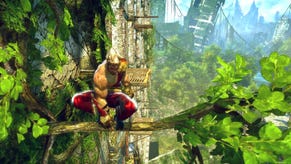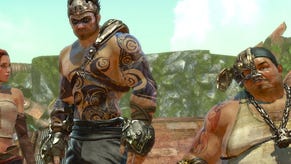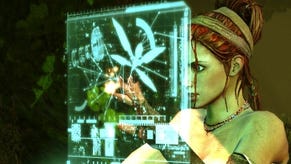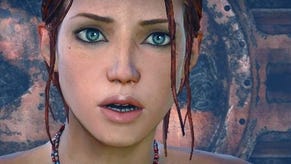Enslaved
Heavenly Sword developer Ninja Theory talks up its next adventure.
Actually it's not really. Monkey does all the really cool robot-dismemberment with all the grease, gristle and sweat associated and he can clamber the environment with great agility. Trip cannot do any of those things and though she is crucial in helping Monkey, who'd want to play Trip?
Andy plays Monkey, and was also instrumental in casting, character development and was co-director with me on the shoot. We really enjoyed working together on Heavenly Sword and had a lot of fun on Enslaved. This time around, Andy and I co-directed the shoot in LA over four weeks with the wonderfully talented actress Lindsey Shaw playing Trip.
Just to be clear and fair to their involvement, our actors are not voice-acting but full performance-acting. We use performance capture where we capture every part of the body, face and voice for multiple actors playing off each other. Though technically and logistically challenging, I believe this is the best way to create characters and dialogue that feels honest and believable.

I don't really know what goes on in [visual art director] Alex Taini's head. He likes redheads and so when we asked him to make Nariko hot, he gave her the longest, reddest hair anyone has ever seen! Trip... well, we asked him to make her hot, but not too hot. Red hair returns, this time shorter. Sigh. He defends this by saying it's a different shade of red.
It's much more of a personal journey between Monkey and Trip, so while other characters come into play, there is not a large ensemble cast. While we were shooting Heavenly Sword, we really had no idea if we could successfully translate nuanced expression into the game. It turns out we could, and far better than I imagined possible.
When Alex Garland became involved, it was clear that we would be tackling darker, more nuanced themes and that has become our new challenge: to be able to read the intent and emotion of characters not by what they say but by what their face and eyes tell you.
We were hugely ambitious on Heavenly Sword. Perhaps a little naïve in our ambition but that is something to celebrate and encourage, not regret. We had no precedent or barometer to judge what a next-gen game should be.
We wanted to create the most beautiful environments seen in a game, to create real drama using acting talent, to go from the smallest detail of facial expression to scenes where you can fight 3000 people on-screen. To create the most complex combat system seen and the first one that happens in a physics-based world. And build an entire engine and toolset from scratch on a hardware platform that was, at the time, still unfinished.
We didn't hit the mark on everything, but we broke new ground in many areas and I am proud of the work that was done as it defines who we are now and what we do as a studio.
It's a joy and a privilege to be creating stories, characters and worlds. On Heavenly Sword I believed that drama was an important companion to gameplay and one of the most common questions we encountered was "Why bother?" Isn't it all about gameplay after all?
I think as human beings we respond to pattern-matching which feeds the head, and stories which feed the soul. Games have been hugely successful at providing pattern-matching challenges but not so great at storytelling. We are getting better at stories but how often are you deeply moved by a game? The rare times it does happen, that game becomes unforgettable, something that shapes you as a human being in the same way that great music, books and films can.
For the types of games we do at Ninja, there should be no gameplay/story divide. They are not competing forces. If you manage to find a synthesis between the two, you are creating something magical and that surely is worth pursuing. That so many talented people are involved in the day-to-day grind in capturing that elusive goal is breathtaking to me.
Enslaved is due out for PS3 and Xbox 360 in 2010.





